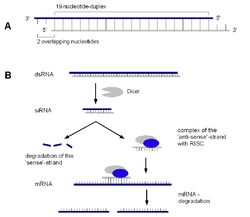2006 Nobel Prize in Medicine awarded to American scientists
Monday, October 2, 2006

This year's Nobel Prize in Physiology or Medicine was awarded on Monday to Andrew Fire and Craig Mellow, for their research on RNA interference.
47-year old Fire is a professor of pathology and genetics at Stanford University, and Mello, 45, is a professor in Molecular Medicine at the University of Massachusetts.
The statement from the Nobel Assembly of the Karolinska Institute in Sweden said: "This year's Nobel Laureates have discovered a fundamental mechanism for controlling the flow of genetic information." Fire and Mello's (then at Washington's Carnegie Institution) seminal publication in Nature in 1998 opened the door for "exciting possibilities", the jury in Stockholm added.
RNA interference (or RNAi) is the process of using double stranded RNA fragments which bind and interfere with a specific messenger RNA, so that it's not longer used to make proteins. It has been recognised as a natural way of gene regulation in plants and animals. Today, the technology is being used by biomedical scientists to fiddle genes involved in diseases such as cancer, and to prevent infection with hepatitis viruses.
Drs. Fire and Mello were elected to the U.S. National Academy of Sciences in May 2005, after they received the organisation's Award in Molecular Biology in 2003. The same year, they got the Wiley Prize in the Biomedical Sciences from Rockefeller University. Science magazine has dubbed RNAi the 2002 "Breakthrough of the Year", and a top 10 scientific advance in 2003. They have received many other prizes, such as the Paul Ehrlich and Ludwig Darmstaedter Prize, and Dr. Mello was the inaugural recipient of The Dr. Paul Janssen Award for Biomedical Research by Johnson & Johnson.
Last year, the 10 million Swedish crown prize ($1.37 million, €1.08 million) was awarded to Barry Marshall and Robin Warren for their discovery of the importance of Helicobacter pylori in ulcers and inflammation of the GI tract.
Sources
- "UMass Medical School Professor Wins Nobel Prize" — University of Massachusetts, October 2, 2006
- Matt Moore, Karl Ritter, AP. "2 Americans win Nobel Prize in medicine" — Yahoo! News, October 2, 2006
- "Two U.S. scientists win Nobel for gene work" — Reuters, October 2, 2006

